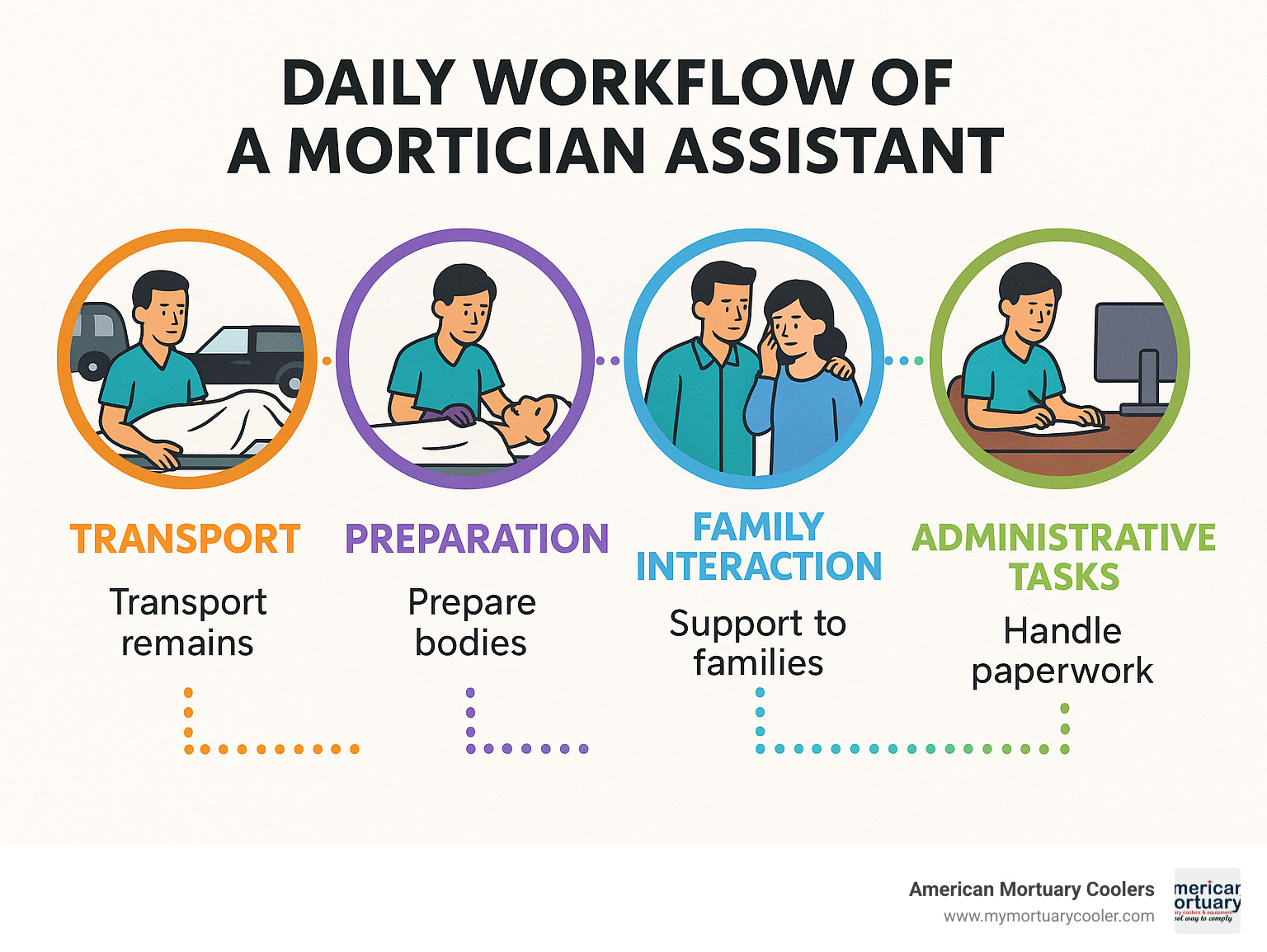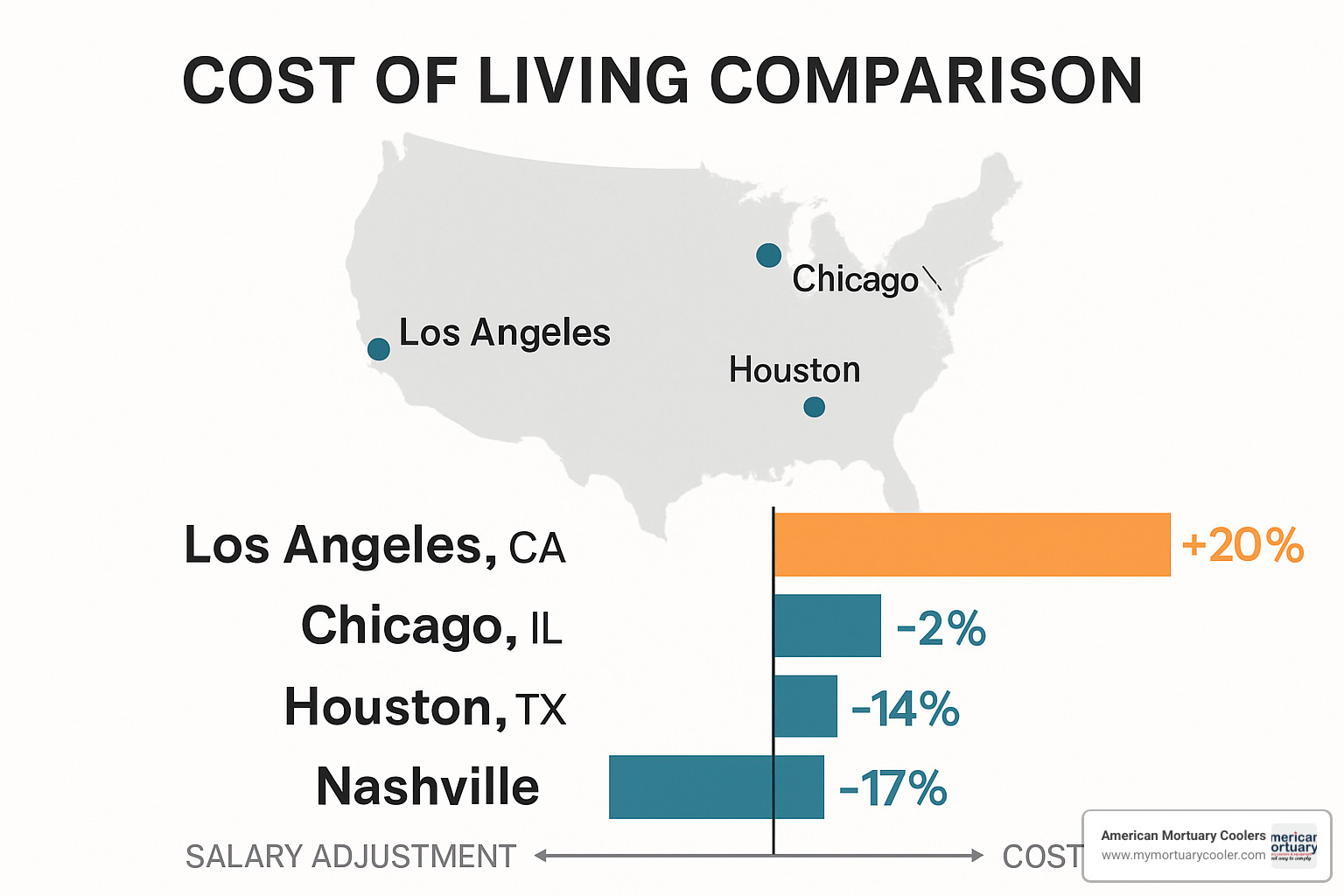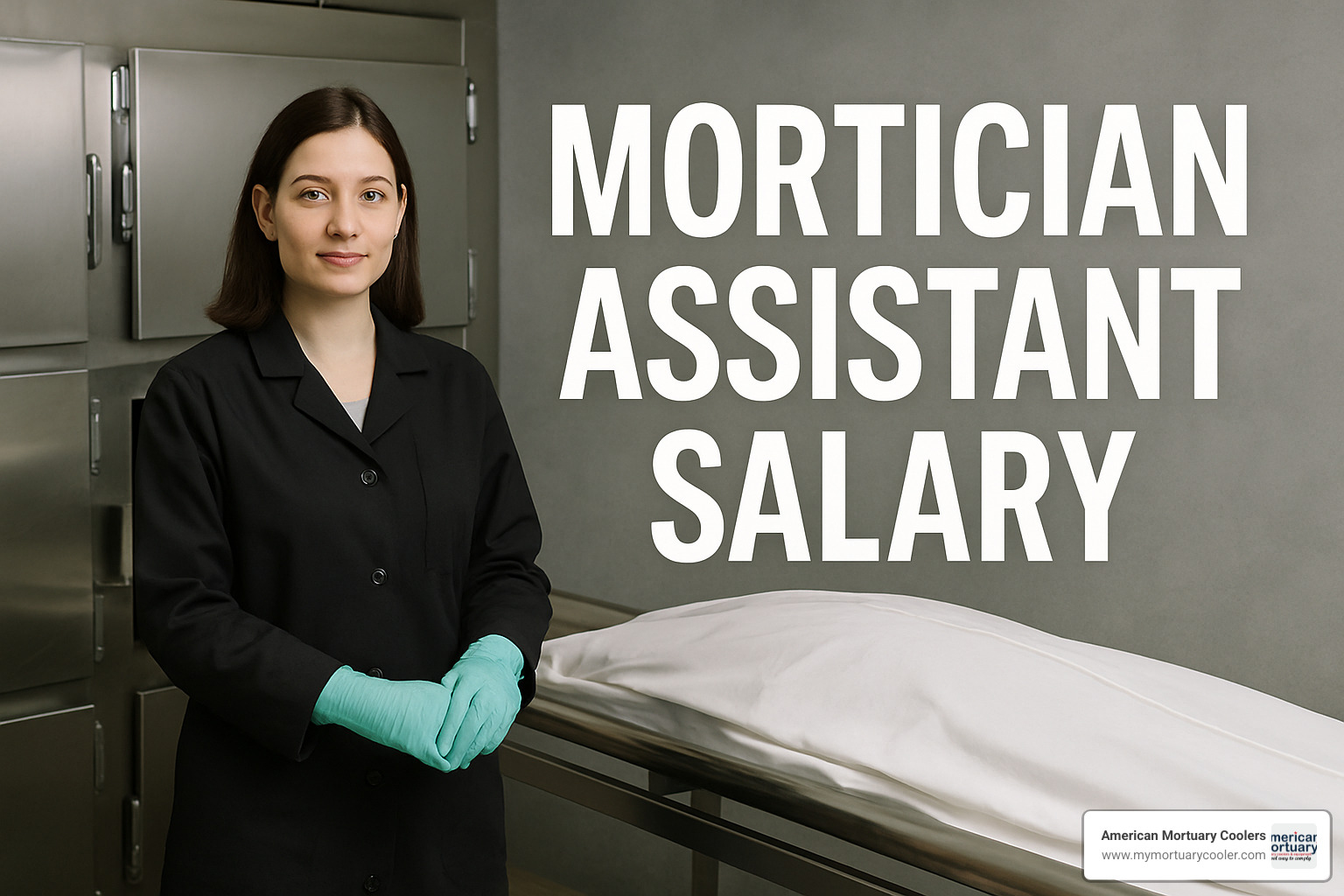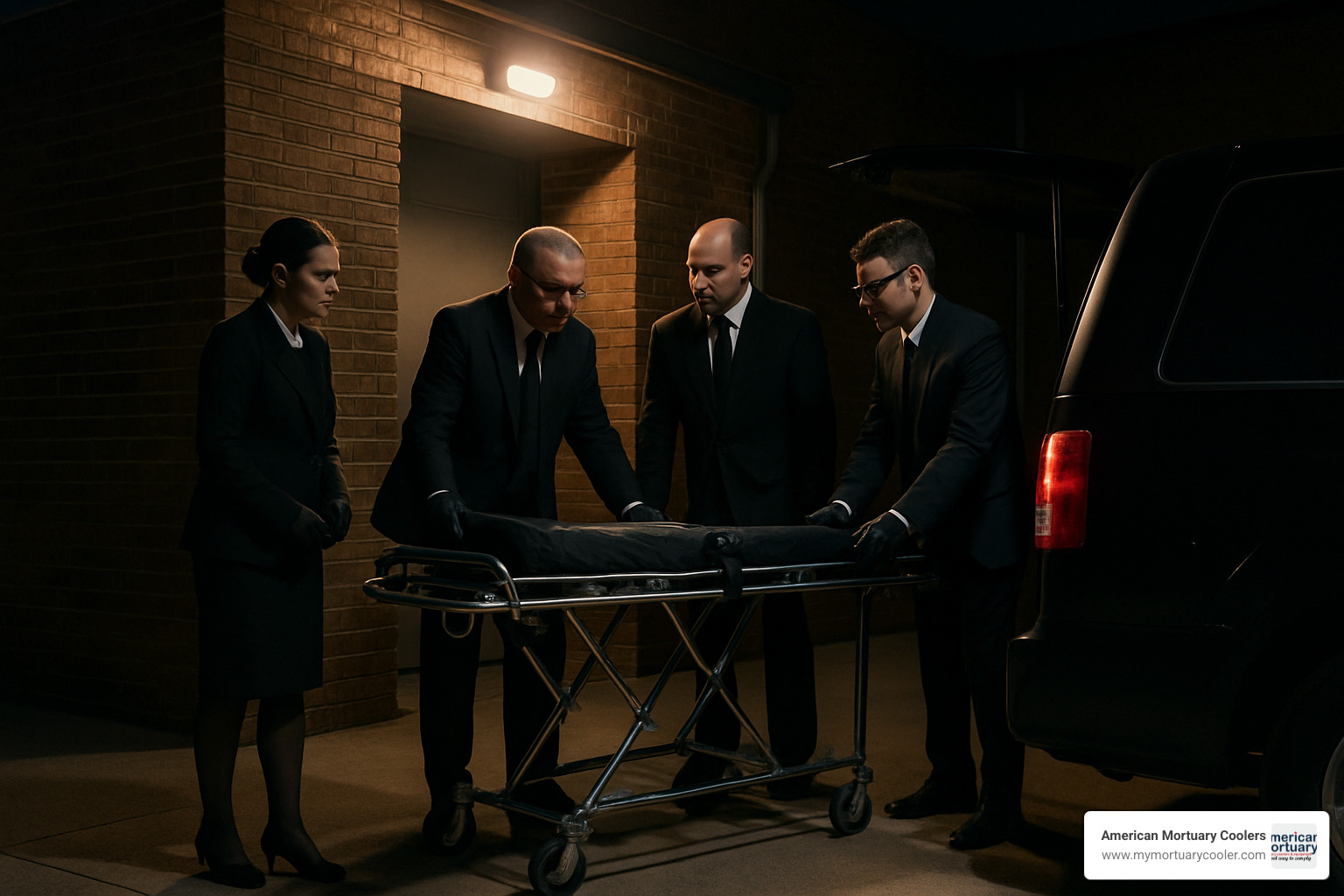Understanding Mortician Assistant Salary Expectations in Today's Market
The mortician assistant salary averages $42,568 per year nationwide, with most professionals earning between $36,352 and $51,729 annually. Here's what you need to know:
Key Salary Facts:
- National Average: $42,568/year ($21/hour)
- Entry Level: $29,150/year
- Salary Range: $36,352 - $51,729/year
- Top-Paying City: San Jose, CA at $53,422/year
- Job Growth: -4% decline projected through 2029
Working as a mortician assistant requires both technical skills and emotional resilience. You'll transport remains, prepare bodies for viewing, assist with embalming (when licensed), and provide compassionate support to grieving families.
The role serves as an excellent entry point into funeral service careers. Many assistants advance to become licensed embalmers earning $42,780 annually, morticians at $54,100, or funeral directors commanding $49,800 per year.
Factors affecting your pay include:
- Geographic location and cost of living
- Years of experience in funeral service
- Education level and professional certifications
- Type of employer (independent vs. corporate funeral homes)
- State licensing requirements
I'm Mortuary Cooler, and through years of supplying mortuary equipment to funeral homes nationwide, I've gained deep insights into industry compensation trends and how mortician assistant salary expectations vary across different markets.

Mortician assistant salary terms at a glance:
The Mortician Assistant Role: Duties & Skills

Being a mortician assistant means stepping into a meaningful role supporting families during their most difficult moments. Through our work supplying equipment to funeral homes nationwide, we've seen how mortician assistant salary reflects the important work these professionals do every day.
This profession requires both heart and skill. You'll work alongside funeral directors and embalmers, often handling multiple services within tight 24-72 hour windows. Safety comes first - you'll need to master proper PPE protocols and follow strict OSHA compliance guidelines.

Day-to-Day Responsibilities
Your workday starts with transporting remains from hospitals, homes, or medical facilities to the funeral home. This requires both physical strength and emotional composure as you coordinate with medical staff and sometimes interact with grieving families.
At the funeral home, you'll handle casket preparation - arranging flowers, positioning the deceased, and ensuring everything looks perfect for viewing. Family support forms a huge part of the role, greeting mourners and providing gentle assistance during services.
Administrative tasks keep everything running smoothly - completing paperwork, managing inventory, coordinating with cemeteries, and sometimes helping with pre-planning services.
Essential Technical & Soft Skills
Success requires mastering infection control procedures and OSHA safety standards. Time management skills become crucial when juggling multiple services. The cosmetic work aspect involves helping prepare bodies for viewing under an embalmer's supervision.
Empathy might be your most important tool. Families need someone who listens without judgment and maintains professional boundaries while showing genuine care.
Top 5 Must-Have Skills:
- Infection Control & OSHA Compliance - Safety protocols and proper PPE use
- Compassionate Communication - Sensitive interaction with grieving families
- Attention to Detail - Meticulous preparation and paperwork accuracy
- Physical & Emotional Resilience - Handling job demands and stress
- Time Management - Coordinating multiple services under tight deadlines
Nationwide Mortician Assistant Salary Snapshot
Let's explore the real numbers behind mortician assistant salary expectations across the country. Through our work with funeral homes nationwide, we've seen how location and experience level can dramatically impact earnings.
| Position | Average Salary | Low Range | High Range | Hourly Rate |
|---|---|---|---|---|
| Mortician Assistant | $42,568 | $36,352 | $51,729 | $21.00 |
| Funeral Attendant | $29,150 | $25,000 | $35,000 | $14.00 |
| Embalmer | $42,780 | $35,000 | $55,000 | $20.58 |
| Mortician | $54,100 | $40,000 | $77,000 | $26.01 |
| Funeral Director | $49,800 | $38,000 | $65,000 | $23.94 |
| Funeral Home Manager | $76,830 | $60,000 | $95,000 | $36.94 |
The clear advancement path shows meaningful salary increases at each career level, making your initial investment in training and experience pay off over time.

Average mortician assistant salary statistics
The mortician assistant salary data shows steady, respectable compensation that grows with experience. At $42,568 median annual salary, you're looking at earnings that can support a comfortable lifestyle in most parts of the country.
Entry-level positions start around $29,150 to $35,000 annually. Mid-career professionals with 3-7 years typically earn $38,000 to $48,000. Experienced assistants with 8+ years can command $45,000 to $55,000.
The hourly equivalent of $21.00 puts mortician assistants ahead of many retail and service positions, with the added benefit of working in a recession-resistant industry.
Benefits packages are another bright spot. Medical insurance is offered by 80% of employers, dental coverage at 48% of positions, 401(k) retirement plans at 65% of workplaces, and paid time off is standard at 75% of funeral homes.
Mortician assistant salary by metro area
Location makes a huge difference in earning potential. San Jose, California leads at $53,422 per year - $10,854 more than the national average. New York City comes in second at $48,500, followed by Los Angeles at $47,800. Chicago offers $44,200, while Houston provides $41,900.
The West Coast generally offers the highest salaries at $45,000-$53,000. The Northeast runs above average at $42,000-$48,000. The Midwest stays close to national averages with $38,000-$44,000, while the Southeast runs slightly below at $35,000-$41,000.
What Influences Your Paycheck?
Your mortician assistant salary depends on several key factors. Experience is probably the biggest factor - a new assistant might start around $29,000, while someone with a decade of experience can earn $55,000 or more. Education level matters too - having some college or specialized training often means starting with higher pay.
State licensing requirements vary dramatically and directly affect both responsibilities and paychecks. The type of employer makes a huge difference - corporate funeral chains typically pay more than small family-owned homes. Geographic location is equally important.
The industry is changing with the growing cremation trend, but memorial services and family support remain essential. Union presence can boost wages by 10-20%, while shift differentials for evening, weekend, or on-call work can add several thousand dollars annually.

Experience & Career Stage Impact
Starting out means earning between $29,150 and $35,000 your first couple of years. You'll spend most of your time learning the ropes and following instructions.
Mid-career professionals with 3-7 years typically earn $38,000 to $48,000 annually. At this stage, you're training newcomers and handling complex family situations with confidence.
Senior-level assistants with 8+ years command $45,000 to $55,000 per year. You've become the go-to person when challenging situations arise.
The management bump is significant. Once you move into supervisory roles, salaries jump to $55,000 to $70,000 annually.
Credentials & Certification Premiums
Having some college coursework typically adds a 5-10% salary premium. An associate degree in mortuary science can increase starting salary by 15-25%, while a bachelor's degree might add 20-30%.
The real game-changer is getting your state embalming license, which can add $8,000 to $15,000 annually. CANA crematory certification typically adds $2,000 to $5,000 annually. OSHA safety certification is often worth $1,000 to $3,000 extra per year.
Employer Size & Setting Matters
Independent funeral homes typically pay $35,000 to $45,000 annually with close relationships but limited advancement. Corporate funeral chains offer $38,000 to $52,000 with comprehensive benefits and clear advancement paths.
Hospital and medical facility morgues pay $40,000 to $55,000 annually with excellent benefits and predictable hours. Government positions offer the highest compensation at $42,000 to $58,000 per year with outstanding benefits and job security.
Education, Licensing & Advancement Pathways
The path to career advancement in funeral service brings increased responsibility and higher mortician assistant salary at each step. Professionals who invest in education and licensing see the biggest salary jumps over time.
Most mortician assistants start with just a high school diploma and learn through hands-on training. But those who pursue formal education and licensing can dramatically increase their earning potential. Our comprehensive guide Everything You Need to Know About a Mortuary Science Degree breaks down exactly what these programs offer.
The licensing timeline requires commitment: two years completing an associate degree, followed by 1-3 years in apprenticeship under a licensed professional, then the state examination with written and practical components.

From Assistant to Director: Growth Steps
Starting as a mortuary assistant earning $29,150 to $51,729, you'll build the foundation of compassion and understanding of funeral operations.
Moving up to licensed embalmer brings a median salary of $42,780 and requires completing that associate degree in mortuary science plus 1-3 years apprenticeship.
Advancing to funeral director at a median $49,800 often requires additional education or extensive experience. You'll coordinate entire funeral processes and handle business management responsibilities.
Reaching funeral home manager level brings a median salary of $76,830 and involves overseeing all operations, managing staff, and handling financial responsibilities.
The ultimate goal for many is funeral home ownership, where earning potential exceeds $100,000 annually.
Tips to Boost Your mortician assistant salary
Start with immediate actions: Pursue additional training by enrolling in mortuary science courses. Obtain certifications starting with CPR and First Aid. Network professionally by joining your state funeral directors' association.
Medium-term strategies: Consider relocating to high-paying metropolitan areas where salaries can be 20-40% higher. Develop specializations in areas like cremation or green burial. Seek leadership roles by volunteering to train new employees.
Long-term career moves: Complete formal education through an associate or bachelor's degree program. Obtain professional licensing, particularly an embalming license, which can increase your salary by $8,000 to $15,000 annually. Consider opportunities with corporate funeral chains that provide clearer advancement paths.
Programs accredited by the American Board of Funeral Service Education are particularly valued by employers and often lead to faster advancement and higher starting salaries.
Job Outlook, Work Schedule & Benefits
The funeral service industry shows a 4% decline projected through 2029, mainly due to increasing cremation rates. However, families still need compassionate professionals for memorial services and emotional support.
Approximately 5,800 positions open annually across the country, creating steady opportunities. The aging population continues to drive overall demand, even as service preferences evolve.

Work Environment Realities
Working as a mortician assistant means embracing an unconventional schedule. Death doesn't follow business hours, so you'll often work evenings, weekends, and holidays. Many positions require 24/7 on-call availability.
Families typically want services within 24-72 hours, which means coordinating multiple moving parts under tight deadlines. Physical demands are significant - you'll work in temperature extremes, handle heavy lifting, and deal with chemical exposure from embalming fluids and disinfectants.
Safety protocols aren't optional. Personal protective equipment and OSHA compliance govern everything from chemical storage to infection control procedures.
Benefits Package Breakdown
The benefits that come with mortician assistant positions often make the total compensation package more attractive than the base mortician assistant salary suggests.
Medical insurance is standard at 80% of employers. Bereavement leave is practically universal. Paid time off typically ranges from 2-4 weeks annually. Uniform allowances are common since professional appearance matters greatly.
Dental and vision insurance appear at about half of all positions. 401(k) retirement plans are offered by roughly 65% of employers, many with matching contributions. Life insurance is frequently provided at no cost.
Tuition reimbursement shows up at progressive employers. Mental health resources are increasingly common, recognizing the emotional toll of the work. Government positions and larger funeral chains often offer pension plans alongside 401(k) options.
Frequently Asked Questions about Mortician Assistant Pay
What is the entry-level mortician assistant salary?
If you're just starting out, expect to earn between $29,150 and $35,000 annually in your first position. That works out to roughly $14-17 per hour for a job requiring only a high school diploma with on-the-job training.
Starting pay depends heavily on location. In San Jose, California, new assistants might start around $38,000, while rural areas might offer closer to $26,000 with much lower housing costs.
Corporate funeral chains typically pay 10-15% more than family-owned funeral homes. If you have an associate degree in mortuary science, you can usually negotiate $3,000-5,000 higher starting pay.
How long does it take to become a licensed embalmer?
The journey to embalming licensure typically takes 3-5 years total. Licensed embalmers earn a median of $42,780 annually - that's $8,000-15,000 more than assistant positions.
The education phase takes about 2 years for an associate degree in mortuary science. Next comes the apprenticeship phase, lasting 1-3 years working under supervision. Finally, the licensing phase takes about 6 months to pass exams and complete requirements.
Do mortician assistants receive overtime or on-call pay?
Yes, most mortician assistants are eligible for overtime pay since they're typically classified as non-exempt employees. Overtime compensation follows standard rules - time-and-a-half for hours over 40 per week.
On-call arrangements usually include standby pay of $2-5 per hour while available. Shift differentials add extra money for evening work ($1-3 per hour) and night shifts ($2-4 per hour).
This additional income can significantly boost your annual earnings. Assistants willing to take regular on-call shifts often increase their mortician assistant salary by $3,000-8,000 per year.
Conclusion
The mortician assistant salary offers a solid foundation for those drawn to helping families during life's most challenging moments. With earnings averaging $42,568 nationwide and genuine opportunities for advancement, this profession combines financial stability with deeply meaningful work.
Your earning potential grows significantly with experience and credentials. Geographic choices make a real difference - professionals in San Jose earn over $53,000 annually, while those in smaller communities might start closer to $35,000.
Education truly pays off in this field. Completing mortuary science coursework can boost your salary by 15-25%, while earning your embalming license typically adds $8,000-15,000 to your annual income.
The industry faces changes with cremation services becoming more common, but families still need skilled, caring professionals. The human element of this work can never be automated.
Through our years serving funeral homes across Tennessee, Georgia, Illinois, South Carolina, Texas, California, New York, and Pennsylvania, we've seen how dedicated mortician assistants become the backbone of their establishments, often advancing to become funeral directors or even funeral home owners.
The projected 4% industry decline shouldn't discourage you. Our aging population ensures steady demand, and funeral homes consistently need reliable, empathetic staff.
Starting as a mortician assistant opens doors to a career filled with purpose. You'll help families celebrate lives, provide comfort during grief, and ensure every service honors the deceased with dignity. The mortician assistant salary might be your entry point, but the relationships you build create rewards that go far beyond any paycheck.
At American Mortuary Coolers, we understand how vital your work is. That's why we deliver durable, custom prep-room solutions nationwide, supporting professionals like you with reliable equipment.
Ready to learn more about our mortuary equipment solutions? Visit our website to find how we can support your funeral service career with quality equipment and nationwide delivery.



















